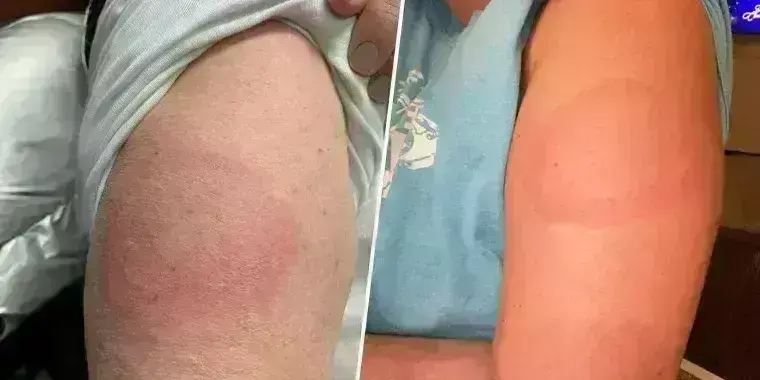- Home
- Medical news & Guidelines
- Anesthesiology
- Cardiology and CTVS
- Critical Care
- Dentistry
- Dermatology
- Diabetes and Endocrinology
- ENT
- Gastroenterology
- Medicine
- Nephrology
- Neurology
- Obstretics-Gynaecology
- Oncology
- Ophthalmology
- Orthopaedics
- Pediatrics-Neonatology
- Psychiatry
- Pulmonology
- Radiology
- Surgery
- Urology
- Laboratory Medicine
- Diet
- Nursing
- Paramedical
- Physiotherapy
- Health news
- Fact Check
- Bone Health Fact Check
- Brain Health Fact Check
- Cancer Related Fact Check
- Child Care Fact Check
- Dental and oral health fact check
- Diabetes and metabolic health fact check
- Diet and Nutrition Fact Check
- Eye and ENT Care Fact Check
- Fitness fact check
- Gut health fact check
- Heart health fact check
- Kidney health fact check
- Medical education fact check
- Men's health fact check
- Respiratory fact check
- Skin and hair care fact check
- Vaccine and Immunization fact check
- Women's health fact check
- AYUSH
- State News
- Andaman and Nicobar Islands
- Andhra Pradesh
- Arunachal Pradesh
- Assam
- Bihar
- Chandigarh
- Chattisgarh
- Dadra and Nagar Haveli
- Daman and Diu
- Delhi
- Goa
- Gujarat
- Haryana
- Himachal Pradesh
- Jammu & Kashmir
- Jharkhand
- Karnataka
- Kerala
- Ladakh
- Lakshadweep
- Madhya Pradesh
- Maharashtra
- Manipur
- Meghalaya
- Mizoram
- Nagaland
- Odisha
- Puducherry
- Punjab
- Rajasthan
- Sikkim
- Tamil Nadu
- Telangana
- Tripura
- Uttar Pradesh
- Uttrakhand
- West Bengal
- Medical Education
- Industry
Moderna COVID-19 vaccine linked to more delayed cutaneous reactions

Moderna COVID-19 vaccine linked to more delayed cutaneous reactions suggests a new study published in The Journal of Allergy and Clinical Immunology
Cutaneous reactions following administration of COVID-19 vaccines have been increasingly reported. Many of these reports focus on various acute reactions. Fewer studies have focused on cutaneous reactions that develop 7 days or more after vaccination (delayed cutaneous reaction). The objective of this study is to determine if delayed cutaneous reactions are reported with more frequency following a COVID-19 vaccine than with other vaccinations.
A VAERS (Vaccine Adverse Event Reporting System) database specific for those eligible for military health care was utilized. Adverse reaction reports following any COVID-19 vaccine and any Influenza vaccines between December 2020 to July 2022 were analyzed. Reports that included “rash” or “hives” were further reviewed to determine the onset of cutaneous symptoms following the vaccination.
Results
2.2% of COVID-19 VAERS reports and 7.6% (16/211) of Influenza VAERS reports included “rash” or “hives”.
When compared to reports from the Influenza vaccinations, cutaneous reactions were not reported with more frequency after a COVID-19 vaccination.
There does appear to be a difference when looking at delayed reactions.
Delayed cutaneous reactions were not reported after Influenza vaccinations alone but were reported in 25.5% of the COVID-19 vaccine VAERS reports with “rash” or “hives”.
Delayed cutaneous reactions were more likely to be reported following the Moderna COVID-19 vaccine.
Delayed cutaneous reactions following COVID-19 vaccinations were reported more frequently than after Influenza vaccinations. Delayed cutaneous reactions were reported with more frequency following the Moderna COVID-19 vaccination than with J&J COVID-19 vaccinations, Pfizer COVID-19 vaccinations, and any Influenza vaccine.
Reference:
Miller C, Skerrett C, Quinn J. Delayed Cutaneous Reactions Following COVID-19 Vaccinations – A Military Cohort Analysis. J Allergy Clin Immunol. 2023 Feb;151(2):AB233. doi: 10.1016/j.jaci.2022.12.725. Epub 2023 Feb 3. PMCID: PMC9895865.
Dr. Shravani Dali has completed her BDS from Pravara institute of medical sciences, loni. Following which she extensively worked in the healthcare sector for 2+ years. She has been actively involved in writing blogs in field of health and wellness. Currently she is pursuing her Masters of public health-health administration from Tata institute of social sciences. She can be contacted at editorial@medicaldialogues.in.
Dr Kamal Kant Kohli-MBBS, DTCD- a chest specialist with more than 30 years of practice and a flair for writing clinical articles, Dr Kamal Kant Kohli joined Medical Dialogues as a Chief Editor of Medical News. Besides writing articles, as an editor, he proofreads and verifies all the medical content published on Medical Dialogues including those coming from journals, studies,medical conferences,guidelines etc. Email: drkohli@medicaldialogues.in. Contact no. 011-43720751


